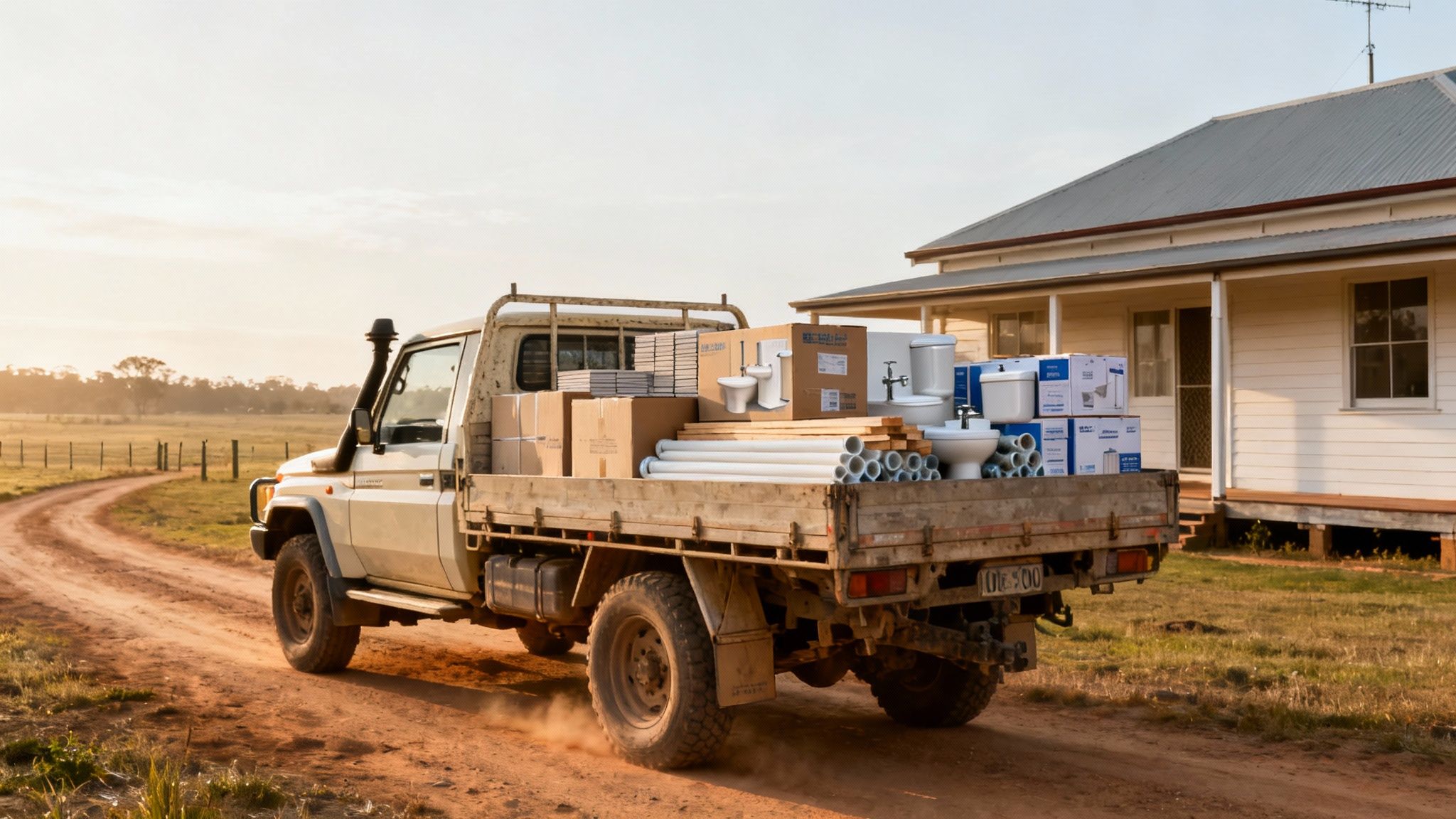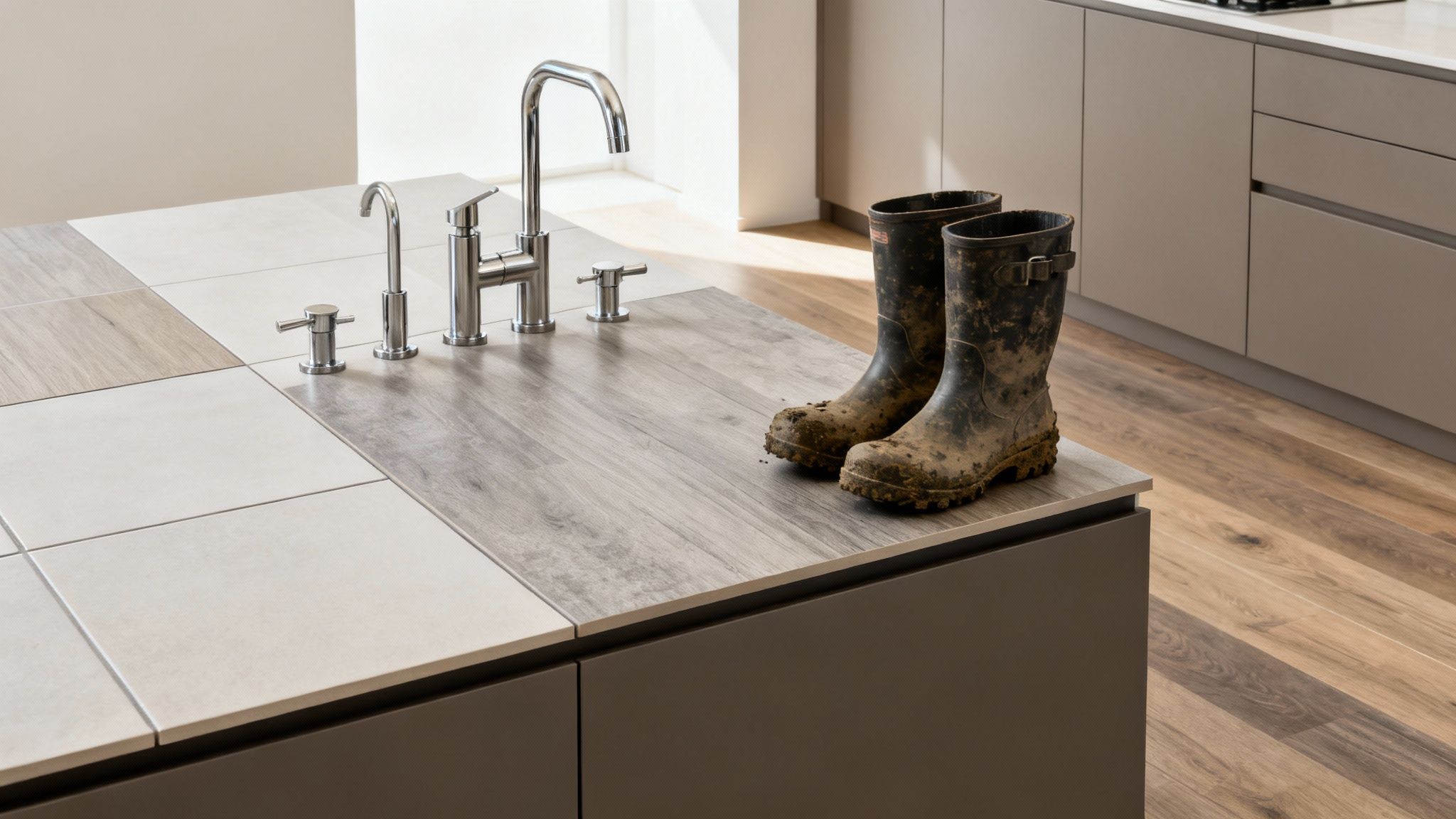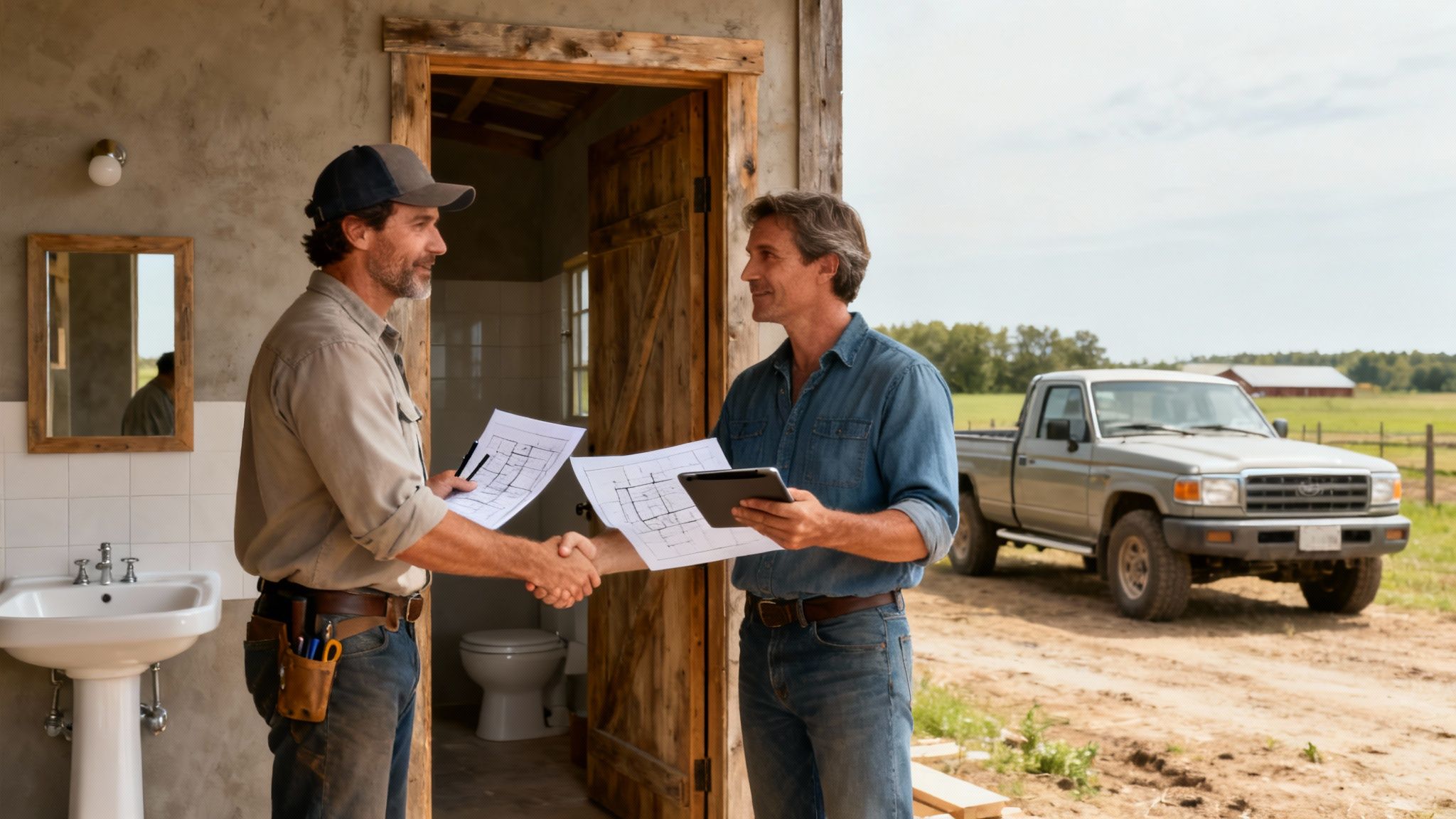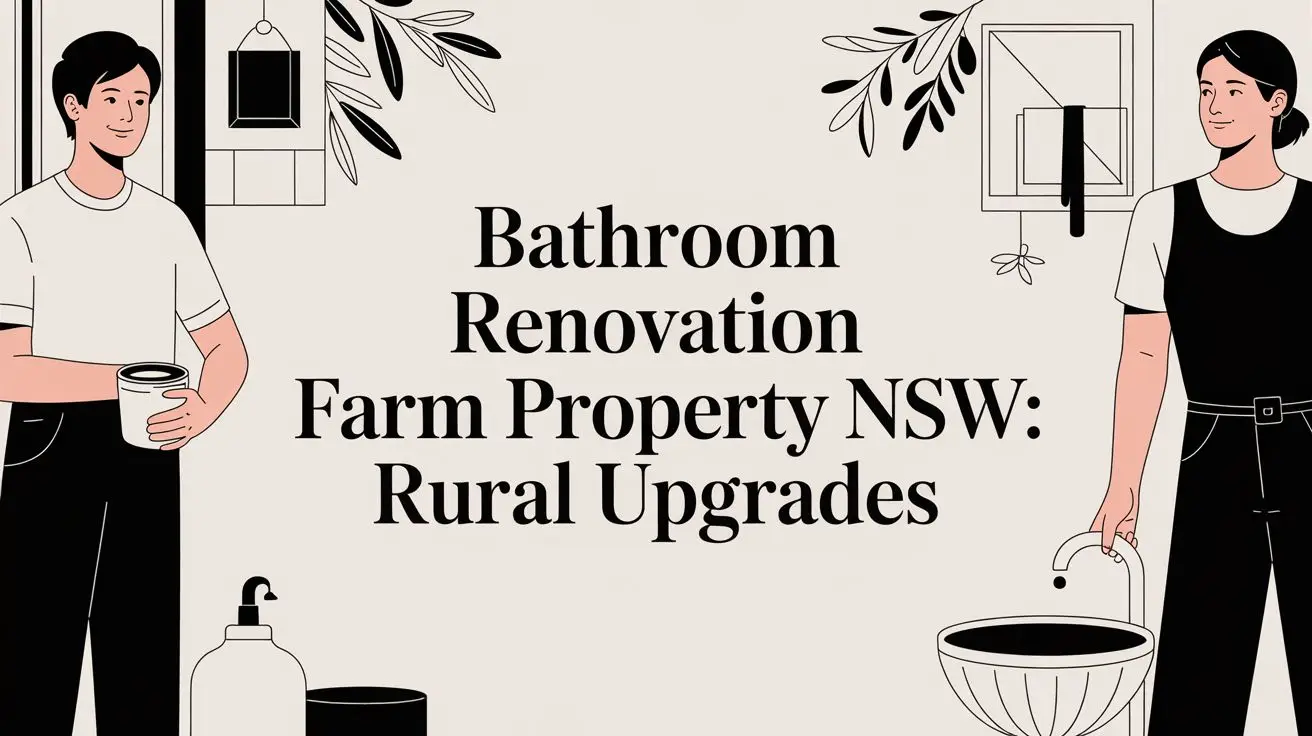Renovating a bathroom on a farm in NSW is a world away from a simple suburban makeover. It’s a project that demands more than a good eye for design; it’s about tackling unique challenges head-on, from tricky access and material durability to finding skilled tradies who can do the job right. Getting it right comes down to solid planning and a genuine understanding of the rural environment.
The Unique Demands of a Rural NSW Bathroom Renovation

Jumping into a bathroom project on a New South Wales farm property is a different beast altogether. While city renos are often about aesthetics and fitting everything into a tight space, rural projects are a battle against distance, dust, and the need for things to be built tough.
The challenges are very real and call for a specialist’s touch. You’re not just popping down to the local hardware store; you’re orchestrating a complex operation, often hundreds of kilometres from the nearest supplier.
Overcoming Remote Logistics
Hands down, the biggest hurdle for a bathroom renovation on a farm property in NSW is logistics. Your average delivery truck simply isn’t built for unsealed roads, creek crossings, or remote farm tracks. This can bring your project to a screeching halt, with damaged materials and massive frustration before you’ve even started.
We saw this as a major roadblock for our clients, so we invested in a solution that completely changes the game.
The secret to a smooth remote renovation is taking logistical guesswork out of the equation. That’s why we run a specialised 10 tonne 4×4 truck, kitted out to access the most remote properties across New South Wales. This rig is our lifeline, allowing us to bring in labour, materials, and equipment where and when it’s needed the most.
What this means for you is that your project isn’t held hostage by third-party couriers or a bit of rain making the road impassable. It guarantees a steady flow of resources, which keeps your renovation on track and on budget, no matter how far out you are. It’s the kind of service that’s non-negotiable for projects where you need certainty, much like the meticulous planning that goes into a bathroom renovation on a cattle station in NSW.
Planning for Durability and Scarcity
Beyond just getting everything to the site, rural renovations require a different way of thinking about materials and labour. The finishes and fixtures you choose have to be tough enough to stand up to everything from bore water minerals to muddy work boots.
Here are a few things you have to factor in for a rural build:
- Material Selection: You need to choose products for their longevity and ability to handle harsh conditions, not just for how they look in a showroom.
- Trade Availability: Finding top-notch plumbers, sparkies, and waterproofers who are willing to travel out to remote sites can be a real headache and often costs more.
- Project Coordination: Every single step has to be planned with military precision. You need to make sure all the right tradies and materials are on-site in the right order to avoid expensive delays where everyone is just standing around.
To make sure your project runs smoothly from start to finish, it’s smart to begin with some essential bathroom renovation planning tips, but always with the unique challenges of a rural NSW property in mind. This guide will walk you through the practical steps, helping you turn potential problems into a well-managed plan for a bathroom that’s not only beautiful but truly built to last.
Navigating Council Approvals in Rural NSW
Before you even think about picking out tiles, the very first, and arguably most important, part of your farm bathroom renovation is a chat with your local council. It’s not the glamorous part, I know, but getting your approvals sorted from the get-go is non-negotiable. Skipping this step can lead to some serious drama—think hefty fines or even being ordered to rip out all your hard work.
The tricky part is that the rules can change dramatically from one local government area to another. What gets a simple nod in the New England region might require a full-blown application down in the Riverina. Getting your head around the local requirements is the only way to ensure your renovation is legal, safe, and actually adds value to your property.
Know Your Approval Pathways
Not every tweak to your bathroom needs the same mountain of paperwork. In NSW, renovations are generally sorted into three different buckets. Figuring out where your project lands is the key to a smoother ride.
Here’s a quick rundown of what you’ll likely encounter:
- Exempt Development: This covers all the minor cosmetic stuff that doesn’t need council approval. We’re talking about things like a fresh coat of paint, swapping out tapware in the exact same spot, or retiling the floor without touching the underlying structure or waterproofing.
- Complying Development Certificate (CDC): This is a faster, streamlined approval for renovations that tick all the right boxes against a set of state-wide standards. A private certifier can often issue a CDC in just a couple of weeks, saving you a lot of back-and-forth.
- Development Application (DA): This is the full-works, most detailed process you’ll go through. It’s almost always required for the big jobs. If you’re moving walls, changing the bathroom’s size, adding a new window, or making any major plumbing and drainage changes, you’ll almost certainly be lodging a DA with your council.
For most substantial bathroom renovations on a farm property in NSW, especially when you’re getting into structural changes or significant plumbing rerouting, the DA is the path you’ll be on. It involves submitting detailed plans, which gives the council a chance to check your project against building codes and environmental health standards.
The Critical Septic System Assessment
On any rural property, your septic system is the unsung hero of your plumbing. Before you get swept away by dreams of a double vanity or a freestanding tub, you have to be absolutely sure your current On-site Sewage Management System (OSSM) can handle the extra workload. This is a classic stumbling block for a bathroom renovation on a farm property in NSW.
Sure, new fixtures are often more water-efficient, but adding more of them can easily overwhelm an older septic tank or its absorption trench. A system that’s pushed past its limit will fail, and that can lead to some pretty nasty environmental issues and eye-watering emergency repair bills.
My best advice? Before you lock in any plans, get a qualified plumber who knows their way around rural properties to give your septic a thorough inspection. They’ll assess its capacity, check the tank and leach field, and tell you straight up if an upgrade is needed to meet local health regulations.
Putting this off isn’t just a risk; it’s a surefire way to hit a wall during the council approval process. Most councils will demand a report confirming your septic system is up to the task as part of any DA submission for a bathroom renovation. Tackling this early saves you an incredible amount of time and stress, ensuring your project is built on a solid, compliant foundation. It’s just smart planning.
Budgeting for Your Farm Bathroom Renovation
Setting a budget for a bathroom reno on a rural property is a completely different beast to its city counterpart. The final figure isn’t just about the cost of tiles and taps; it has to account for the realities of distance and access. Think remote logistics, freight charges for heavy materials, and often, travel costs for your tradies—these can all add a significant chunk to the bottom line.
A bathroom renovation on a farm property in NSW demands a budget that’s both meticulously detailed and surprisingly flexible. The costs can swing wildly, from a simple, practical refresh of an existing space to a full-blown, high-end overhaul designed to be a homestead retreat. Getting your head around this spectrum is the first real step in your financial planning.
We’ve seen the average cost of bathroom renovations creep up right across New South Wales, and that’s especially true for regional and farm properties. Heading into 2025, a typical bathroom project in the greater Sydney area, which captures many semi-rural properties, is landing somewhere between AUD 25,000 to 30,000. That’s a hefty 24% rise since 2021, driven largely by material costs and skilled labour shortages.
While you might get a basic job done for around AUD 15,000, a luxury renovation can easily sail past the AUD 35,000 mark. It’s well worth getting a feel for the current market by exploring Sydney’s 2025 renovation costs to ground your expectations.
Breaking Down the Key Expenses
Knowing where the money is likely to go is half the battle. It gives you clarity and helps you make smarter decisions, like where to invest in top-tier durability and where you can afford to be a bit more frugal. To get this right, you need to understand how to accurately estimate your expenses from the get-go. Taking a look at a professional guide to estimating construction costs is a great way to ensure your numbers are realistic from day one.
Before you even get to materials, remember that council approvals can have a big impact on your preliminary costs. The pathway you need to take depends entirely on the scope of your work.

As you can see, minor cosmetic tweaks might not need any approval at all. But as soon as you start moving walls or making major changes to plumbing, you’re almost certainly looking at a more involved and costly Development Application (DA) process.
Sample Budget Allocation for a Mid-Range Farm Bathroom Renovation
To help you visualise it all, I’ve put together a sample budget breakdown. This table shows a typical percentage allocation for a mid-range bathroom renovation on a farm property in NSW. Of course, your final numbers will shift based on your specific choices, but this is a solid framework to start your planning.
| Expense Category | Estimated Percentage of Total Budget | Key Considerations for Farm Properties |
|---|---|---|
| Labour | 40-50% | Includes travel time for tradespeople, potentially at a higher rate. |
| Fixtures & Fittings | 15-20% | Tapware, toilet, basin, shower screen. Opt for robust, low-maintenance options. |
| Waterproofing & Tiling | 10-15% | Critical for longevity; non-negotiable quality. Includes labour and materials. |
| Plumbing & Electrical | 10-15% | May involve complex work related to septic systems and water pumps. |
| Cabinetry/Vanity | 5-10% | Choose moisture-resistant materials that won’t warp with humidity changes. |
| Contingency Fund | 10-15% | Absolutely essential for unforeseen issues like hidden rot or pest damage. |
This breakdown really highlights how labour can be the biggest slice of the pie, especially in a rural setting. It’s also a reminder to prioritise the things you can’t see, like waterproofing and plumbing, as cutting corners there will only lead to expensive problems down the track.
One line item I tell every rural client is non-negotiable is a contingency fund of at least 10-15%. On a farm, you’re just far more likely to uncover something unexpected—from old, non-compliant plumbing hidden in a wall to structural surprises from a previous DIY job. Having that buffer means those discoveries won’t derail your entire project.
Selecting Materials Built for Farm Life
A farm bathroom isn’t just a room; it’s a high-traffic utility zone that has to stand up to some serious punishment. It needs to handle muddy boots traipsing in from the paddock, fluctuating humidity, and often, the mineral-rich reality of bore or tank water. Choosing materials is less about chasing fleeting trends and more about investing in long-term resilience.

This is where a bathroom renovation on a farm property in NSW demands a different mindset. The goal is to select finishes and fixtures that will look and function just as well in five years as they do on day one. It’s about building a space that is tough, practical, and still a pleasure to use.
The unique demands of a farm setting directly influence material choices and, ultimately, the project costs. Rural NSW homes need robust fittings to withstand harsher conditions—everything from dust and moisture to heavy daily use. This focus on durability is part of a wider trend. The national bathroom fittings market was valued at around USD 429.82 million in 2023 and is tipped to grow significantly, reflecting a broad investment in quality renovations, even in demanding rural areas. You can find more details on this in the Australian bathroom fittings market report from Credence Research.
Flooring That Can Handle Farm Grime
The floor is your bathroom’s first line of defence. It has to be waterproof, slip-resistant, and tough enough to handle the grit and dirt carried in on work boots without scratching. While you want it to look good, durability is the absolute non-negotiable.
Here are the top contenders I recommend for a rural bathroom floor:
- Porcelain Tiles: This is the undisputed champion for farm bathrooms. Porcelain is far denser and less porous than standard ceramic tile, making it exceptionally resistant to water, stains, and scratches. Always go for a textured or matte finish to provide better grip when the floor is wet.
- High-Quality Vinyl Planks: Modern luxury vinyl is a world away from the old-school lino. It’s completely waterproof, warmer underfoot, and can convincingly mimic the look of timber or stone without the fussy maintenance. Its resilience makes it a fantastic, practical choice for a busy farmhouse.
Whichever you choose, professional installation is everything. Proper sealing and grouting for tiles, or a seamless fit for vinyl, is critical to ensure moisture can’t get through to the subfloor and cause rot or structural damage down the line.
Fixtures and Tapware That Combat Hard Water
If your property is on bore water, you’re almost certainly dealing with ‘hard’ water, which is loaded with minerals like calcium and magnesium. Over time, these minerals can wreak havoc on standard tapware, causing ugly limescale buildup that clogs up the works and corrodes internal components.
When selecting taps and fixtures for your bathroom renovation on a farm property in NSW, you need to think from the inside out. Look for reputable brands known for quality internal mechanisms, like ceramic disc cartridges. They are far more resilient and long-lasting than the old rubber washers.
A simple tip I always give clients with bore water is to choose tapware with a PVD (Physical Vapour Deposition) or electroplated finish in chrome or brushed nickel. These finishes are incredibly tough and much easier to clean, resisting the white, chalky buildup that can plague lesser-quality fixtures.
The same logic applies to showerheads. Opt for models with flexible silicone nozzles. That way, you can just rub them with your thumb to dislodge mineral deposits, keeping the water pressure strong and extending the life of the fixture. Spending a little more on quality tapware upfront will save you countless headaches and replacement costs.
Cabinetry Built for Humidity Swings
A farmhouse bathroom often cops greater temperature and humidity swings than a suburban home with steady climate control. This environment can be brutal on cabinetry, causing materials like standard MDF to swell, warp, or delaminate surprisingly quickly.
For your vanity and storage units, prioritise moisture-resistant materials. Plywood with a quality veneer or cabinetry made from laminate-sealed, high-moisture-resistant (HMR) board are both excellent choices. These materials are engineered to hold their shape and integrity in damp conditions.
Finally, remember that good ventilation is your best friend. Installing a high-capacity exhaust fan, properly ducted to the outside (not just into the ceiling cavity!), is one of the smartest investments you can make. It actively protects your new bathroom from mould and moisture damage, helping all those tough materials last even longer.
Managing Your Project and Finding the Right Team

When it comes to renovating a bathroom on a farm, choosing your builder is easily the most important decision you’ll make. This isn’t your average suburban reno. A bathroom renovation on a farm property in NSW is a masterclass in logistics, and you absolutely need a team that’s been there and done that in a remote setting. Get this right, and a potentially chaotic process becomes a well-oiled machine.
The timing is interesting, too. We’re seeing a major shift in the NSW construction industry. As new home builds slow down, renovation spending has skyrocketed. Data shows that between 2018-19 and 2023-24, renovation work jumped from 34.2% to 40% of all residential construction spending across Australia. Here in NSW, it’s even more pronounced, with renovations now making up about 49% of the pie.
You can read more about this NSW home renovation surge from KPMG. What does this mean for you? While there are more contractors looking for work, it’s more critical than ever to weed out the ones who don’t have genuine rural experience.
Vetting Contractors for Rural Realities
When you’re interviewing potential builders, you need to ask questions that go deeper than the standard “Are you licensed and insured?” A slick portfolio of inner-city projects doesn’t mean a thing when you’re dealing with a muddy track and a septic system.
It’s time to get specific. Here are the questions that will tell you what you really need to know:
- Tell me about your experience with off-grid plumbing. Get them to walk you through previous jobs involving septic tanks and bore or tank water.
- How do you handle material deliveries to a remote property? If they don’t have a clear, confident answer, that’s a huge red flag. A seasoned rural builder will have this process down to a fine art.
- Can I speak to some of your past clients on farms or other remote properties? Nothing beats talking to someone who has been in your exact position.
- What’s your plan B for access issues? Ask how they factor in things like a week of heavy rain turning your access road into a bog.
These questions help you sort the true rural specialists from the city builders just trying their luck. For a better feel for what separates the pros, it’s worth understanding the qualities of an expert bathroom builder in NSW.
The logistical challenge is the make-or-break factor for any remote project. We directly address this by operating our own 10 tonne 4×4 truck. This heavy-duty vehicle is our commitment to getting the job done, allowing us to bring in all the necessary labour, materials, and equipment to the most isolated properties around New South Wales, exactly when they’re needed.
Having this kind of in-house capability is not a small detail—it’s central to managing a rural project successfully. It means we aren’t at the mercy of third-party couriers who don’t have the right gear or an understanding of your property’s unique access challenges.
Understanding the Contract and Insurance
Once you’ve settled on the right team, a comprehensive, clear-as-day contract is your best friend. This document should leave zero room for interpretation, spelling out the full scope of work, a detailed payment schedule tied to milestones, and firm start and completion dates.
Never sign anything that feels vague or open-ended. A good contract protects everyone involved by setting crystal-clear expectations from day one.
Finally, let’s talk about the non-negotiable: insurance. This is the safety net you simply cannot do without.
Your Insurance Checklist
- Contractor’s Public Liability Insurance: This is for covering accidental damage to your property or injury to people. Always ask to see a current Certificate of Currency.
- Workers Compensation Insurance: A legal must-have. It covers the builder’s team if they get hurt on your site.
- Home Building Compensation Fund (HBCF) Insurance: In NSW, your builder must provide this for any project valued over $20,000. It’s your protection if the builder dies, disappears, or goes insolvent.
Making sure all this paperwork is in order isn’t just a formality. It’s about protecting your investment and giving you total peace of mind while your new bathroom takes shape.
Your Farm Bathroom Renovation Questions, Answered
When you’re renovating a bathroom on a farm in NSW, the questions are always a bit different from a city job. It’s not just about tiles and tapware; you’re dealing with unique challenges around access, water, and waste. Getting your head around these issues early is the key to a project that runs smoothly.
Let’s walk through some of the most common queries we get from property owners. The aim here is to give you the practical, no-nonsense advice you need to handle the specific hurdles of a rural bathroom upgrade.
How Will My Septic System Affect the Renovation?
Think of your septic system as the foundation of your entire bathroom plan. Its current capacity dictates what’s actually possible. Dreaming of a big freestanding tub or adding a second sink? Your septic has to be able to handle the extra load.
It’s not just about capacity, either. Any new plumbing needs to have the right ‘fall’ to ensure waste drains properly to the tank. Get this wrong, and you’ve got serious problems down the line.
Before you fall in love with a design, get a plumber with real rural experience to inspect your septic. They’ll tell you straight up if the tank and leach field can cope or if an upgrade is needed. This is a crucial step that will have a big impact on your budget and timeline.
What Are the Biggest Logistical Headaches for Remote Builds?
For any bathroom renovation on a farm property in NSW, the major headaches almost always come down to three things: getting onto the property, getting materials delivered in one piece, and finding good tradies. Your average delivery truck just isn’t built for winding, unsealed farm roads, which often leads to delays, or worse, damaged supplies.
This is exactly why working with a builder who has the right gear is non-negotiable.
We invested in a purpose-built 10 tonne 4×4 truck for this very reason. It’s designed to navigate the toughest tracks and get everything—from the team to the tiles—to even the most remote properties across New South Wales. It means we control the logistics, allowing us to bring in labour, materials, and equipment where and when it’s needed the most.
On top of access, you’ve got the challenge of finding skilled plumbers, electricians, and tilers who are willing to travel. This can be tough and often adds to the cost. It all comes down to careful coordination, making sure the right people and the right materials show up in the right order to avoid expensive downtime.
How Can I Get Decent Water Pressure in the New Bathroom?
It’s a classic rural problem: fantastic views, but the water pressure from the tank or bore is a bit lacklustre. There’s nothing worse than a new shower that just trickles. The solution? Talk to your plumber about a pressure pump right at the start.
A good pump will give you strong, consistent pressure that feels just like being on town water. It really can make all the difference to your daily routine.
Your choice of fixtures matters, too.
- Water-efficient showerheads are often a smart choice, as many are designed to work well even with lower pressure.
- That beautiful big ‘rain’ showerhead, on the other hand, will almost certainly need a pressure pump to perform as it should.
Getting a handle on your water supply and planning for any necessary pumps should be one of the first things you do. It’s the best way to make sure your new bathroom doesn’t just look the part, but works perfectly for years to come.
Ready to tackle the unique challenges of your rural renovation? With 35 years of hands-on experience and our specialised 4×4 equipment, Awesim Building Contractors is set up to deliver outstanding results for farm properties across NSW.



